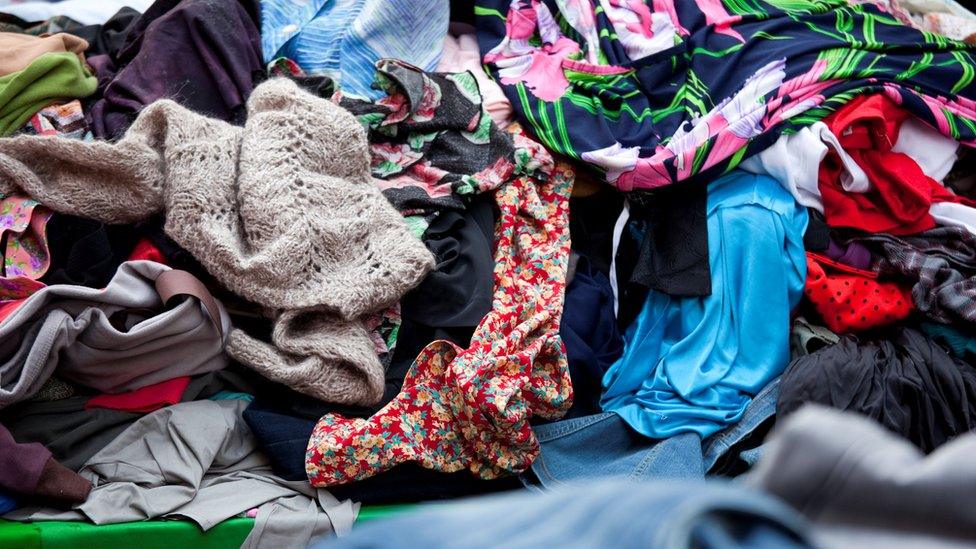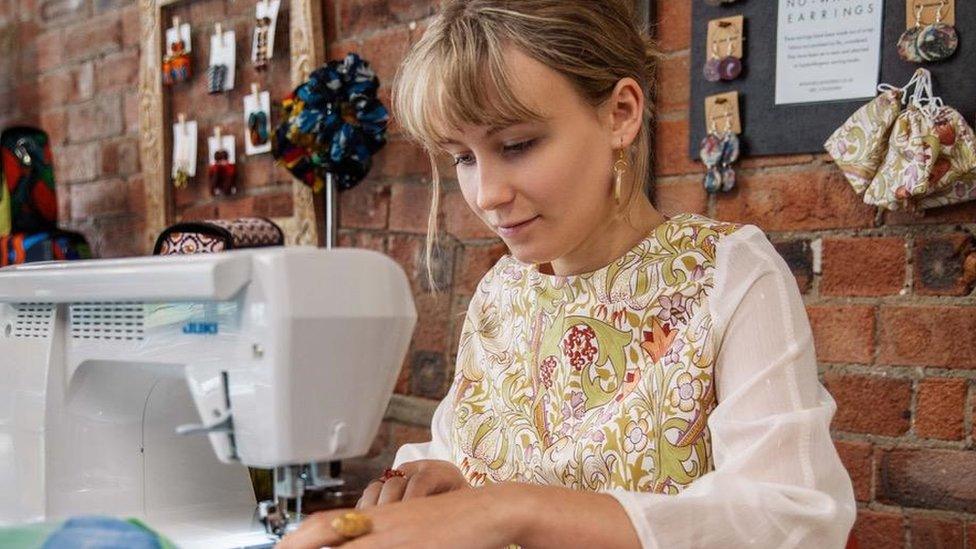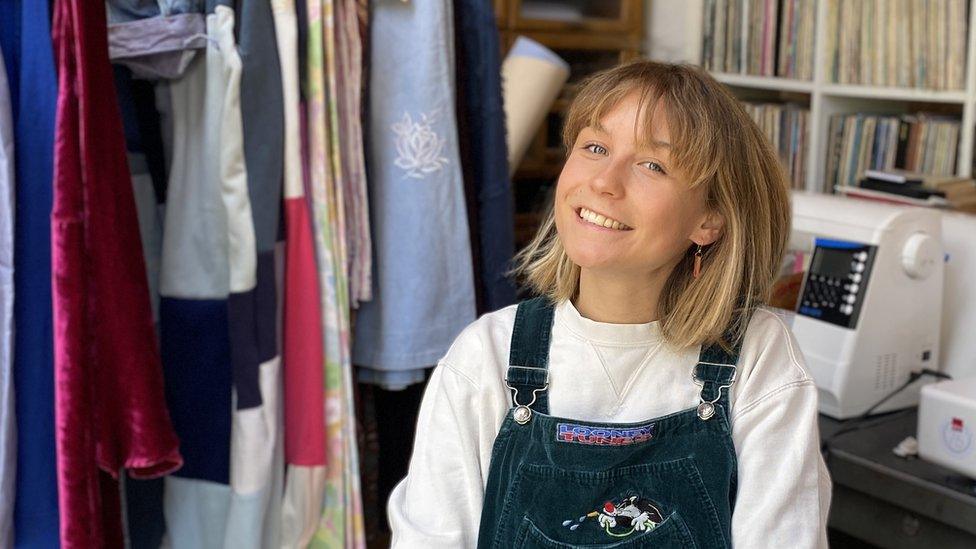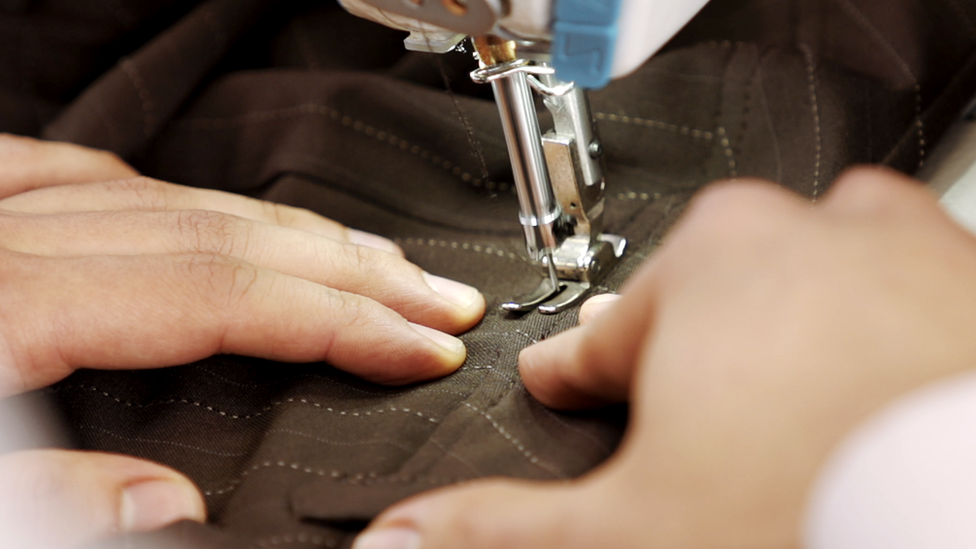What to do with clothes you no longer wear
- Published

Model Ellie Jolliffe was shocked by waste in the fashion industry
Model Ellie Jolliffe says she was shocked at the amount of waste she saw when working on modelling jobs, in particular for e-commerce companies.
"I've been on shoots where there are boxes and boxes of deadstock - clothes which are no longer on sale. They've never been worn. No-one wants to buy them. Tonnes of unused clothing goes to waste."
The 20-year-old Londoner began studying sustainability. She found herself queuing for castings while reading books on the environmental and human impact of fashion.
"I figured out pretty quickly that I needed to lay down some boundaries in terms of who I'd work with," she says.
She also realised she had to change her own habits.
"I would often do cheap fast fashion orders, especially before events," she says. "A lot of the clothes I bought then are still sitting in my wardrobe, unused."
Now, Ms Jolliffe buys second-hand clothes from eBay, charity shops or kilo sales.
"I feel much better," she says. "I still have plenty of clothes and I'm paying no more than I would if I was buying fast fashion."
Stepping away from fast fashion, she insists, is not synonymous with stepping away from fashion.
"There are lots of ways to dress that don't compromise people or planet."

Most unwanted clothes are either incinerated or end up in landfill
Fast fashion refers to the quick turnover of fashion trends and the move towards cheap, mass-produced clothing - with new lines constantly released.
It is often blamed for waste in the industry.
Some companies have taken it to a new level. Ultra-fast fashion firms, like China's Shein, external, release new clothes onto the market every day.
Experts say that is putting pressure on the environment.
"Fashion is an extremely resource intensive industry," says Catherine Salvidge, sustainable textile sector specialist for the Waste and Resources Action Programme (Wrap). "It fuels climate change, water scarcity, pollution and biodiversity loss."
Around 25% of materials end up as waste before they even reach the customer, says Ms Salvidge, and at the end of the chain we are disposing of more clothing than ever.
According to Wrap, external, some 921,000 tonnes of used textiles end up in our general waste every year, which is then either incinerated or sent to landfill.
"To address the root cause of the problem, we need to consume less new clothing and keep it in use for longer," says Ms Salvidge.
Repurposing unwanted clothes into new items, she says, could help us curb our reliance on raw materials.

Re_considered takes unwanted clothes and makes them into something new
Some firms are offering ways to slow fashion down.
Re_considered takes unwanted clothes and transforms them into something new, so-called upcycling.
Say you have a dress you no longer wear, Re_considered could rework it into a matching top and shorts set for about £30. If you want a skirt taken up at the hem it will cost from £8.
They'll even take an old pair of curtains and make something new from it for about £45.
Whatever it is, you can apply online to arrange a five minute virtual appointment when you'll chat about your desired design. You then send them your old clothes or fabric, they rework it - and send a whole new outfit back to you.
"Before starting Re_considered," says founder Tabby Bunyan, "I would buy new items of clothing every other week. I enjoyed the instant gratification but rarely cherished what I bought. I hardly ever wore things more than a handful of times."

Tabby Bunyan hopes to make upcycling a mainstream activity
But during the first lockdown, Ms Bunyan suddenly found she had no access to shopping. To satisfy her desire for something new, she started re-working the clothes in her own wardrobe.
In the summer of 2020 the Re_considered brand was born when she took some upcycled clothes to a pop-up shop in London, which stocked the little collection for three months.
After that, Ms Bunyan started doing custom upcycles for friends, turning the clothes they didn't like any more into new things.
"It's inevitable that style changes over time. I love that, through upcycling, you can change and update your wardrobe without buying new."
Having upcycled 520 items of clothing so far this year, Re_considered is barely a speck in the fashion landscape.
But Ms Bunyan hopes to take upcycling from niche to mainstream.
"Repairing and repurposing services are becoming more accessible, and exciting, to a younger audience," she says. "Consumer habits are changing."

Josephine Philips founded Sojo in 2021
Josephine Philips fell out of love with fast fashion in her late teens, repulsed by reports of exploitation in the industry.
She turned to buying second-hand clothes but became frustrated when she couldn't find clothes that were a good fit.
It inspired her to start Sojo, the UK's first clothing alterations app, in early 2021.
It's a pretty simple system. Enter your postcode, state the alterations or repairs you need, and select a date and time for collection. Sojo take your order to a local tailor and drop it back to you a few days later.
Sojo's costs range from £6 for repairing a ripped seam to £35 to tailor a blazer.
Now aged 24, Ms Philips says people want sustainable fashion but often they don't know how to sew and are accustomed to convenience.
She wants a change in the attitude to clothing. Instead of fast fashion, where shoppers rush out to buy the latest look despite already owning loads of clothes, Ms Philips wants a move towards slow fashion.

Sojo aims to make tailoring more convenient
"We're going against hyper-consumption," she says.
"We think everyone should love their clothes for years to come. Tailoring and repair is a true slow fashion behaviour."
As well as individual tailoring, Sojo also offers tailoring services to online fashion brands like Denmark's Ganni.
According to Wrap, external, almost two-thirds of UK adults say, since the pandemic, they are more aware of the environmental impact of fashion and the importance of making their clothing last longer.
The global ethical fashion market is expected to reach more than $10bn USD by 2026, which the World Wildlife Fund describes an eco-awakening, external.
Ms Salvidge says: "We are seeing an increasing number of the businesses moving into resale, rental and repair, as well as apps which encourage us to shop our own wardrobes, instead of buying new clothes.
"These are encouraging steps, but there is still a long way to go to scale these models and encourage customers to use them. We need to ensure both businesses and citizens are onboard to make a circular economy for the fashion industry a reality."


Ms Bunyan thinks it is hard for consumers to work out which companies have a truly sustainable model. She says some firms engage in greenwashing - splashy announcements, that don't amount to much.
Back in London, Ms Philips has plans to take Sojo to the next level, growing its location coverage and increasing brand partnerships.
"There's a growing a stigma that comes with engaging with fast fashion," she says. "The future of fashion is slow - having clothes that you love, that fit you well and that last a long time."